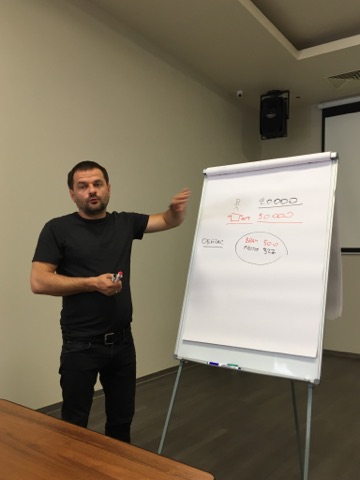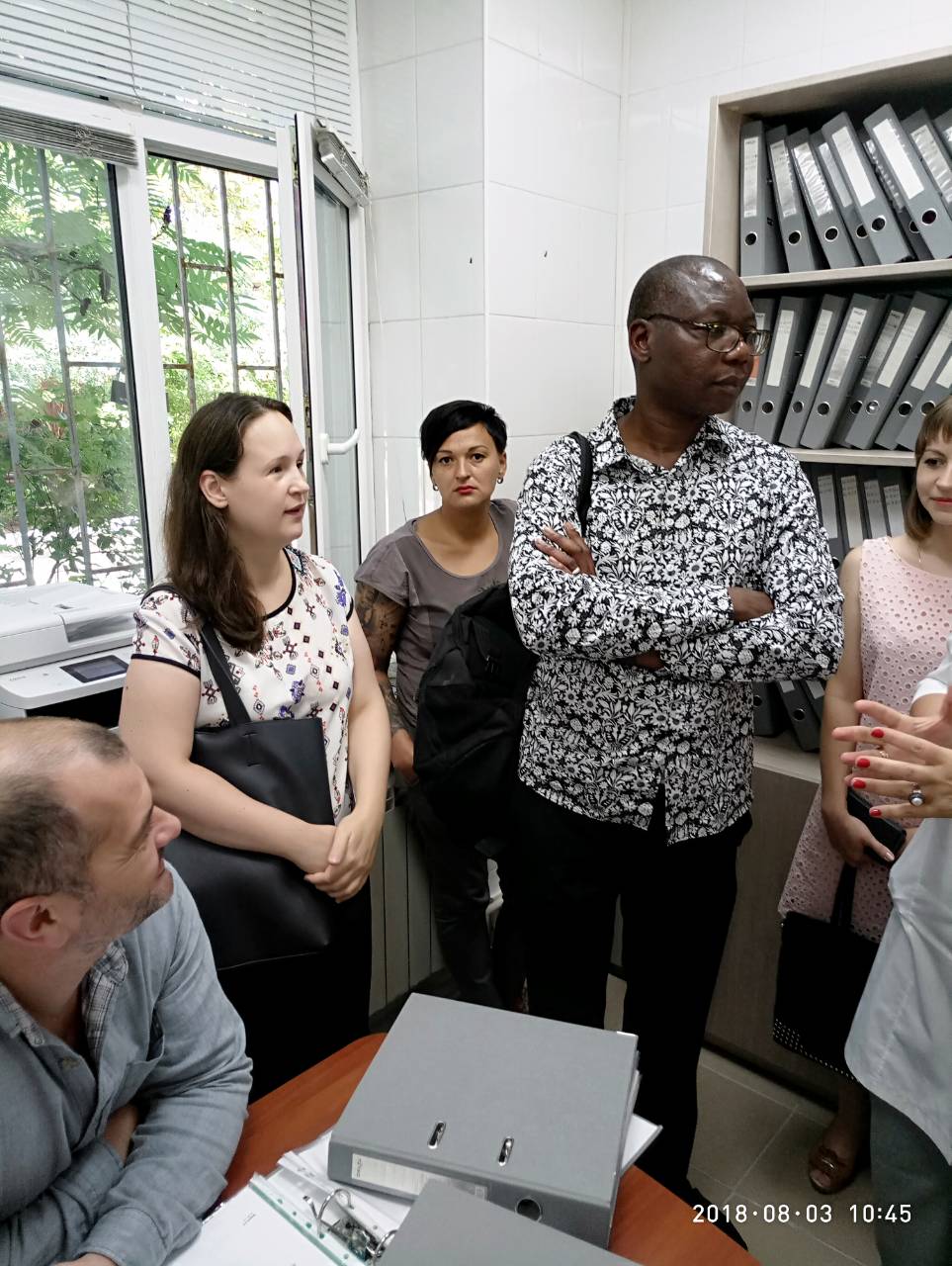“Ukrainians are not afraid to adopt children with HIV-status” – interview with social worker
The social worker of the outpatient department of the Kyiv City AIDS Prevention and Control Centre, the consultant on social issues of the charitable organization “100 Percent of Life. Kyiv Region” Yulia Melnyk told the readers of the portal “Orphanhood – No!” of Rinat Akhmetov’s Foundation on how social support of families with HIV+ children is provided.
How can a family with a HIV+ child receive social support? How many families receive this service?
Social support of families which have children with HIV status is given automatically. And practically no one refuses it. When a child with HIV status is identified, both the doctor and the social worker register this family. First of all, we work with adults who are engaged in raising a child, care about, and monitor her/his health. We inform the family, we talk about the problem and what they need to change in the life for strict adherence to antiretroviral therapy. We talk about the process of treatment that requires lifelong drug administration. The information content is important in our work; parents must understand what kind of disease it is, how to live with it and treat the child. Everything is not so terrible and they do not need to dwell on this process. We also control the child’s treatment with doctors. Currently, about 190 children are registered at the AIDS Prevention and Control Centre in Kyiv.
How is the implementation of recommendations for the family monitored at the AIDS Centre?
Control is carried out by the social worker and the doctor. But we do not come home, this is not provided because it requires unnecessary temporary costs. But they can come here, write, call us; we are always available. In addition, in Kyiv there are two communal centres, the left bank one and the right bank one, for children and young people living with HIV. These government facilities have resources for working with families, including at home, if necessary. We have the same tasks to improve adherence to treatment in the family with HIV+ child status, so that while growing the child also becomes a conscious supporter of antiretroviral therapy.
How can you control whether the adults who care about the child follow regimen and how can you compel the family to follow all the doctor’s prescriptions if they were ignored or completed partially?
If those who cares about the child does not follow the prescribed treatment regimen or does not strictly adhere to it, then test results will show it, even if they hide it. According to the schedule, the doctor strictly monitors the condition of the child who is registered at the AIDS Centre. If the family missed monitoring tests and did not report the cause of non-appearance, it would be a signal to the doctor to make all efforts to protect the rights of the child. After all, in our case, it is not just about health, but about the life of the child. Denial of antiretroviral therapy or a violation of the regimen of drug intake can have severe and irreversible consequences: the virus begins to progress in the body and coexisting diseases may aggravate health condition. And if an adult can decide whether to be treated or not, but he/she has no right to refuse the offered treatment of the native or the entrusted child. The state guards the rights of the child. And if the family violates its rights or does not guarantee them, we involve the whole system that protects children’s rights, including the right to treatment.
In such cases, we use official letters to contact the children’s service, the centres of social services for family, children and youth, district infectious disease doctors, and the police; in other words, we involve the disciplinary team to full reinitiating of the prescribed treatment. In our case, there is a threat to the child’s life if the prescribed regimen is not adhered. We explain some legal norms for the family to prevent a careless attitude towards the treatment of the child.
And if the family of HIV-infected children has the unexpected misfortune and this factor threatens to violate the treatment regimen, we are, of course, inform the aforementioned district services for children and centres of social services for family, children and youth. In addition, we cooperate with charitable foundations, seeking help and assistance to the family that is in a crisis situation.
Unfortunately, a rather high percentage of deaths are among parents with HIV status; as a rule, the biological parents with HIV in blood are PLWH (people living with HIV) themselves. It happens that parents are seriously ill and die because they refuse antiretroviral therapy for fictitious reasons, although they give drugs to their children.
Therefore, we have a lot of children who are under care of their grandparents or are raising in new families.
What are families which learned about the HIV status of their children mostly interested in?
First of all, it is a disclosure of the status. They are afraid of mentioning it in a medical card and, if this happens, how they will then be regarded among other people. After all, a doctor in a kindergarten or a school understands a professional cipher, but we assure the family that the medical cards for kindergartens and schools should not indicate this diagnosis in any way. But they themselves should not talk about it to others.
It is interesting for adults how and when it is necessary to disclose the status for the child. This is a difficult time for parents. They fear tension in relationships and the child can blame them for transmitting HIV to them. And then we involve a psychologist who prepares the family for a very important conversation.
We prepare parents to talk with the child about the status from an early age. This is important for the child to have conscious attitude to treatment and establish rules for safe living for him/herself and others. From my point of view, it is abnormal if a 16-year-old girl with HIV status taking antiretroviral therapy thinks she drinks vitamins. But she may have sexual intercourse… Without knowing her status, she will be mainly worry about preventing unwanted pregnancy, rather than protecting herself and her partner from sexually transmitted diseases. Lovers trust each other; often in a more mature age they do not think about safe sexual relations.
From what age should you start talking with your child about the status?
According to the recent world practice experience, it is recommended to disclose HIV status to children when they age eight. We prepare parents to tell children about their status according to the child’s age. We offer good informational materials. Neither the doctor, nor the social worker has the right to tell the child about the status. Only the father or the person who replaces him can do this. If the child has already known the status, it is much easier for the doctor, the social worker and for parents themselves to develop the child’s adherence to treatment and safe behaviour. After all, if a person believes to drink vitamins and sees that those who do not drink them do not die, he/she does it reluctantly or may not take the medicine or take it out of time, if it is out of constant control. And if the patient knows why he/she takes these drugs and that without taking them on time he/she causes irreparable harm, then the child will control himself. By disclosing the child’s status, the parents raise the child’s involvement in own treatment.
Parents, probably, share their observations with you. What reaction do they observe when they disclose HIV status to their children?
Mostly, children react adequately: “I guess, I knew, I was waiting to be told about it.” Usually, parents and children find mutual understanding and do not perceive it as a tragedy, because children see that nothing is terrible with them and they do not differ from their peers. They only need to take drugs timely. But this is not the only chronic disease which requires lifelong drug administration. For example, there are diabetes and asthma which also require treatment throughout their lives.
You mentioned that many children with HIV status are under guardianship or live in new families. How serious are the attitude of surrogate parents to the treatment of their children with HIV? How important is the social support for them? Is there a general trend?
Foster and adoptive parents of children with HIV status are mostly active consumers of social support services because they consciously take children with HIV status in their families. As a rule, these people do not belong to the category of PLWH (people living with HIV), so they themselves cannot fully perceive the experience of a person with such status. But they are trying to understand the essence of the problem, so they are very interested in all the issues; they often call us and attend training.
The adoptive parents know that the child needs antiretroviral therapy throughout her/his life, and became father and mother for the child is especially high motivated. Therefore, this category of adults is the most responsible and interested in the correct treatment of the child, developing adherence to treatment, and involvement in this process.
And, of course, we pay as much attention to them as everyone else who has such a strong interest. We try to find answers to all their questions.
The moment of adopting a child with HIV status is always very touching for us. It means that our information work to remove stigma from people and in particular children with HIV has achieved its goal. Ukrainians are not afraid to adopt children with HIV status.
I would like to tell about the recent story which can be regarded as New Year’s fairy tales with a happy end. One-year-old baby was taken to the children’s hospital from the street after alienation from the mother. The mother begged with the child in her arms. Of course, this mother did not think about the treatment and the creation of acceptable living conditions for her daughter. During the child’s testing, HIV and many other infections were detected. Parents of another kid who was treated at the same time at this hospital began to help the child with HIV giving her pumpers, infant milk, and other things. They were so interested in the life of the girl and so attached to her that they decided on adoption. Of course, somebody dissuaded them, but they replied, “Well, so what if someone will not understand us. It is important that we understood this for ourselves, we understood this baby. We know what we have to do and we are not afraid.”

